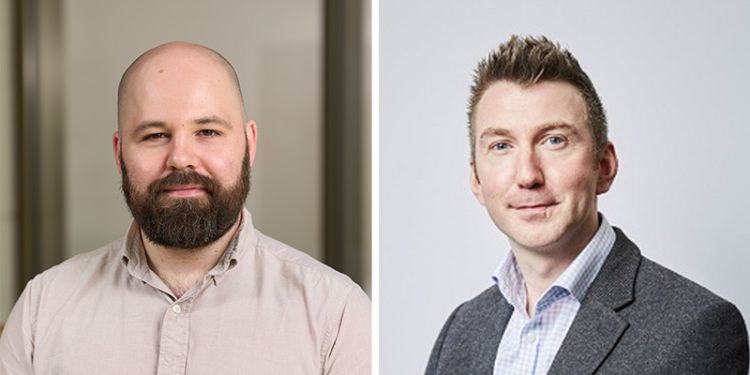Leeds duo awarded prestigious fellowships to tackle major health challenges

Two University of Leeds researchers have been awarded prestigious Leverhulme Trust Research Fellowships to develop innovative solutions with the potential to transform healthcare worldwide.
The fellowships, awarded by the Royal Academy of Engineering and supported by the Leverhulme Trust, give leading mid-career engineers the chance to dedicate a year solely to research by funding a replacement for their teaching and administrative duties.
In the latest round of fellowships, only eight awards were made across the UK. Leeds claimed two of them, courtesy of Dr James Chandler, from the School of Electronic and Electrical Engineering, and Dr Anthony Herbert from the School of Mechanical Engineering. Between them, the pair look to pioneer cutting-edge treatments that could pave the way for wholesale changes to the way we treat common health problems.
MAGPIE (Dr James Chandler)
Dr Chandler is leading MAGPIE – “Magnetic-Pneumatic Intelligent Endoluminal Robots for Lifesaving Care” – a project to create tiny, flexible surgical robots that could one day make complex procedures safer, less invasive, and more precise.
These millimetre-scale “soft robots” will be able to move through the body’s natural pathways to reach areas that are currently difficult for surgeons to access without large incisions. By combining two advanced technologies – wireless magnetic control and gentle, low-pressure fluidic movement – the robots will be able to adapt their shape as they travel, improving navigation and reducing the risk of tissue damage.
MAGPIE’s dual-control approach aims to overcome the limitations of existing soft robotic designs, which often rely on a single movement method, thereby sacrificing versatility. In the future, this technology could open the door to entirely new minimally invasive surgical techniques, helping patients recover more quickly and with fewer complications.
Dr Chandler said: “I am extremely grateful to have been given this opportunity by the Royal Academy of Engineering and Leverhulme Trust, and delighted to represent the University. This Fellowship will provide me the unique position of devoting the year ahead solely to research, and I’m excited to see where this will lead.”
Multi-STEP (Dr Anthony Herbert)
Dr Herbert is developing a new laboratory platform called Multi-STEP – “Multi-scale STructural Evaluation Platform for in-vitro musculoskeletal disease models” – to improve how scientists study musculoskeletal diseases, which affect around one in three people in the UK.
Current tools for testing new treatments are limited, and often don’t reflect how these diseases behave in real human tissue. Multi-STEP will use an innovative approach based on decellularised biological scaffolds – healthy tissue that has had all its cells and DNA removed, leaving behind the natural structure that gives tissue its shape and strength. This structure can then be “repopulated” with human cells to mimic diseases such as tendinopathy, allowing researchers to study them in a realistic and controlled way.
Dr Herbert said: “I’m thrilled to have received this prestigious award and the opportunity it provides in launching my research in a new and exciting direction. Leeds has a strong history of success in gaining these Fellowships, and it is a privilege to join the ranks of the previous successful academics.”
Leverhulme Trust Research Fellowships are known for supporting bold, forward-thinking ideas. This year’s UK-wide awardees are working on diverse challenges, eco-friendly nanocomposite food packaging, quantum microscopes for energy-efficient electronics, and AI for safer autonomous vehicles.
Professor Mark Sandler FREng, Chair of the Fellowships panel, said: “We are truly inspired by the work of this year’s awardees and proud to support exceptional individuals whose pioneering research will play a vital role in shaping a smarter, safer, and more sustainable world.”
Further information




